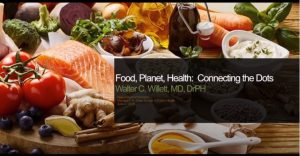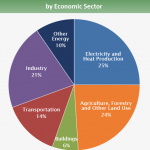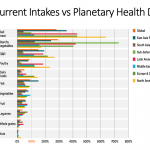When thinking about what we can each do to protect the environment, most of us know that our car choices matter, and that insulating our homes is an important way to reduce energy use. But what about our food choices?
According to the IPCC the Agriculture, Forestry and Land Use (AFOLU) sector “is responsible for just under a quarter of anthropogenic GHG emissions mainly from deforestation and agricultural emissions from livestock, soil and nutrient management.”BTW: This does not include the greenhouse gas emissions that result from transporting food.
The environmental impact of the food system is enormous, but more importantly, that impact varies significantly based on what we choose to eat every day because … all foods are NOT created equal (literally). Producing a hamburger requires significantly more land, water, and nitrogen fertilizer than producing a bean burger.

On June 4th, the relationship between food choices and the environment was explored more in depth at a meeting run by members of Green Needham and hosted by Representative Denise Garlick. A group including policymakers, academics, and food industry stakeholders – farmers, entrepreneurs, food service providers, and food justice advocates – came together to listen, learn, and discuss actions needed to create a more sustainable and equitable food system in Massachusetts.
The meeting began with a presentation by Dr. Walter Willett, Harvard T.H. Chan School of Public Health Professor, world renowned expert on public health, and co-chair of the EAT Lancet Commission on Food, Planet, Health. The Commission, which is made up of more than 35 experts in various scientific fields, was tasked with determining if the planet has the capacity to feed a healthy diet to 10 billion people (predicted population in 2050) without depleting and degrading the earth’s resources to the point that future generations will be imperilled. The Commission issued its findings in January, in the report: “Food in the Anthropocene: the EAT–Lancet Commission on healthy diets from sustainable food systems.”
Dr. Willett described the Commission’s methods and the overarching conclusions of the report:
- Without a major transformation of the global food system, our children and grandchildren will inherit a degraded and unstable planet.
- Adoption of healthy dietary targets could prevent about 11 million premature deaths/year, 20-25% of total deaths.
- We must shift toward healthier dietary patterns – reducing meat and sugar consumption by 50%, reduce food loss and waste by 50%, and improve food production practices. Multi-sector, multi-level actions are needed.
- Feeding 10 billion people a healthy diet is possible and would allow us to pass on to future generations a viable planet.
So the good news is that WE CAN sustainably feed 10 billion people. The other good new is that the optimal diet for the health of the planet, the Planetary Health Diet, is also the optimal diet for human health. The bad news is that the Planetary Health Diet is not the diet most Americans are currently eating. As mentioned above, the U.S. must reduce meat (particularly red meat) and sugar consumption by 50%. We also need to reduce our food waste by 50%. If we fail to do either of these, we will not meet our emission reduction goals established in the Paris Climate Agreement.
Dr. Willett’s presentation was eye opening, and scary, but also hopeful. All the necessary resources exist to make the changes that are needed. The big question then is whether the stakeholders in policy making and food services will take action.
Identifying actions was the goal of the second half of the meeting. The attendees broke up into discussion groups by sector and got to work. Each participant viewed the presentation through the lens of, and provided insight based on, their area of expertise. Priority goals, opportunities, challenges, and action items were identified for each sector. At the end of the night, the groups shared these with each other, and common threads emerged. These included the need for cross-sector collaboration, financial incentives, community education, and an investment in technology.
As productive as the meeting was, the hard work is still to come to move from discussion about actions to actual action. In her capacity as a legislator, Representative Garlick is already leading the way by recently signing on as a cosponsor of H.873, An Act to promote healthy soils and agricultural innovation within the Commonwealth. Thank you Representative Garlick!!! Other attendees have mentioned plans to take action in the positions they hold as well.
As for the rest of us… our role is arguably the most important, and rewarding, part of the solution. By eating more thoughtfully (50% less meat – particularly red meat, and 50% less sugar) we get to feel better, reduce our risk of developing chronic illnesses (heart disease, type 2 diabetes and certain cancers), while protecting and preserving the planet. Seems like a sound investment in ourselves, and one that will provide a sizable return on investment for future generations.



